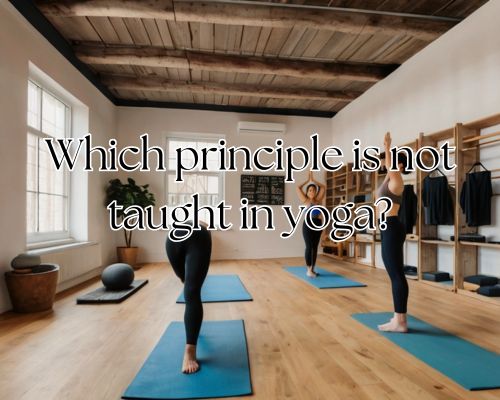Yoga, in all its forms, is widely regarded as a holistic practice that unites mind, body, and spirit. With thousands of practitioners across Mornington, Australia and countless yoga studios offering Hatha, Vinyasa, Yin, and even trauma-informed yoga classes, there is growing curiosity about the philosophical framework underpinning yoga. While principles such as Ahimsa (non-violence), Satya (truthfulness), and Aparigraha (non-possessiveness) are core tenets taught universally, an interesting question arises: Which principle is not taught in yoga?

Let’s unpack this from both an educational and experiential standpoint, while maintaining a firm focus on localized, and insightful content.
Understanding the Foundational Principles of Yoga
Yoga is not merely physical postures (asanas). It is a multidimensional discipline with roots in ancient Indian philosophy. The foundational principles stem from the Eight Limbs of Yoga, as codified in the Yoga Sutras of Patanjali. These include:
- Yama (ethical restraints)
- Niyama (observances)
- Asana (postures)
- Pranayama (breath control)
- Pratyahara (withdrawal of senses)
- Dharana (concentration)
- Dhyana (meditation)
- Samadhi (blissful absorption or enlightenment)
Each of these categories contains further sub-principles that are universally taught in traditional and modern yoga practices in studios from Mornington to Mysore.
The Commonly Taught Principles in Yoga Studios
In Mornington, Victoria—a region known for its peaceful coastline, wellness culture, and vibrant yoga scene—practices are guided by the classical yogic principles, often tailored to suit modern lifestyles. Yoga teachers in Mornington typically emphasize:
- Ahimsa (non-harming): Avoiding harm to oneself and others, physically and mentally.
- Satya (truthfulness): Encouraging honesty in thought, speech, and action.
- Asteya (non-stealing): Letting go of envy and desire for what isn’t rightfully yours.
- Brahmacharya (moderation): Living in balance, often interpreted as energy regulation.
- Aparigraha (non-attachment): Letting go of material and emotional clinging.
These are reinforced alongside mindfulness, conscious breathing (pranayama), and presence during asana practice.
So, Which Principle is Not Taught in Yoga?
Here’s the heart of the question. Among the many values associated with yoga, competition is a principle not taught in yoga. In fact, it is often actively discouraged.
Unlike high-intensity workouts or sports where performance is measured, yoga encourages inward focus. Yoga is not about who can stretch the farthest or hold a pose the longest—it’s about inner awareness, alignment, and self-compassion. The philosophy of yoga steers students away from the ego-driven need to outdo others.
In Mornington yoga studios like Bikram Yoga Mornington, this non-competitive ethos is not just implied—it’s explicit. Students are frequently reminded that “your yoga is your own,” and modifications are encouraged rather than frowned upon.
Why Competition is Contrary to Yogic Philosophy
From an SEO perspective, salient related terms include ego, non-attachment, self-awareness, mindfulness, and spiritual practice. Let’s see how they relate.
- Ego vs. Self-Awareness: Yoga strives to dissolve the ego (ahamkara)—the false sense of “I am better than others”—and replace it with awareness (smriti) and equanimity.
- Non-Attachment: A core principle, aparigraha, teaches detachment from outcomes—including achievements or accolades in a class.
- Spiritual vs. Performative: Practicing yoga competitively turns it into a performance, which negates its meditative and spiritual roots.
Even the Yoga Alliance—a global body that certifies yoga teachers—underscores yoga’s non-competitive essence in its code of conduct and curriculum standards.
Yoga Culture in Mornington, Australia
Mornington Peninsula is home to a robust wellness community. Studios like Bikram Yoga Mornington, Aloha Yoga, and The Yoga Room Mount Eliza offer diverse classes that attract both beginners and seasoned yogis.
Here’s how Mornington yoga culture reinforces non-competitive values:
- Individualized Attention: Instructors focus on body awareness and customization, not conformity.
- No Mirrors in Studio: Many studios deliberately avoid mirrors to discourage comparison.
- Mindfulness over Mastery: Mindful movement is prioritized over perfecting postures.
- Inclusive Class Structures: Sessions are designed to welcome all ages and body types.
These practices ensure that newcomers don’t feel intimidated and that long-time practitioners remain grounded in humility.
Common Misconceptions About Yoga Principles
Let’s address a few beliefs that people might falsely assume are part of yoga philosophy:
- Perfectionism is a goal — ❌ Not true. Yoga teaches progress, not perfection.
- More flexibility means better yoga — ❌ False. Mind-body awareness is key, not hypermobility.
- You must be spiritual to practice yoga — ❌ While rooted in spirituality, yoga is also a secular tool for wellness.
- Competition builds motivation — ❌ In yoga, competition builds ego and inhibits mindfulness.
The Importance of Maintaining Authentic Practice
In a wellness-driven town like Mornington, where the sea breeze mixes with eucalyptus-scented air and classes often spill into beachside parks or boutique studios, maintaining authenticity in yoga practice is crucial. Commercialization can sometimes dilute the essence of yoga—but Mornington’s yoga educators tend to stay true to the philosophical roots.
Prominent local yoga practitioners often integrate mindfulness, Ayurvedic insights, and the ethical precepts of yoga into their classes and workshops. This holistic model ensures that residents aren’t just getting a workout—they’re engaging in a life practice.
Final Thought
The heart of yoga beats to the rhythm of inner stillness, not external achievement. In Mornington, where ocean views meet ancient wisdom, the yoga mat becomes a place of personal exploration—not competition.
So, if you’re wondering which principle is not taught in yoga, let the answer be a gentle reminder: You are not here to compete. You are here to connect. With breath. With body. With being.
Namaste.